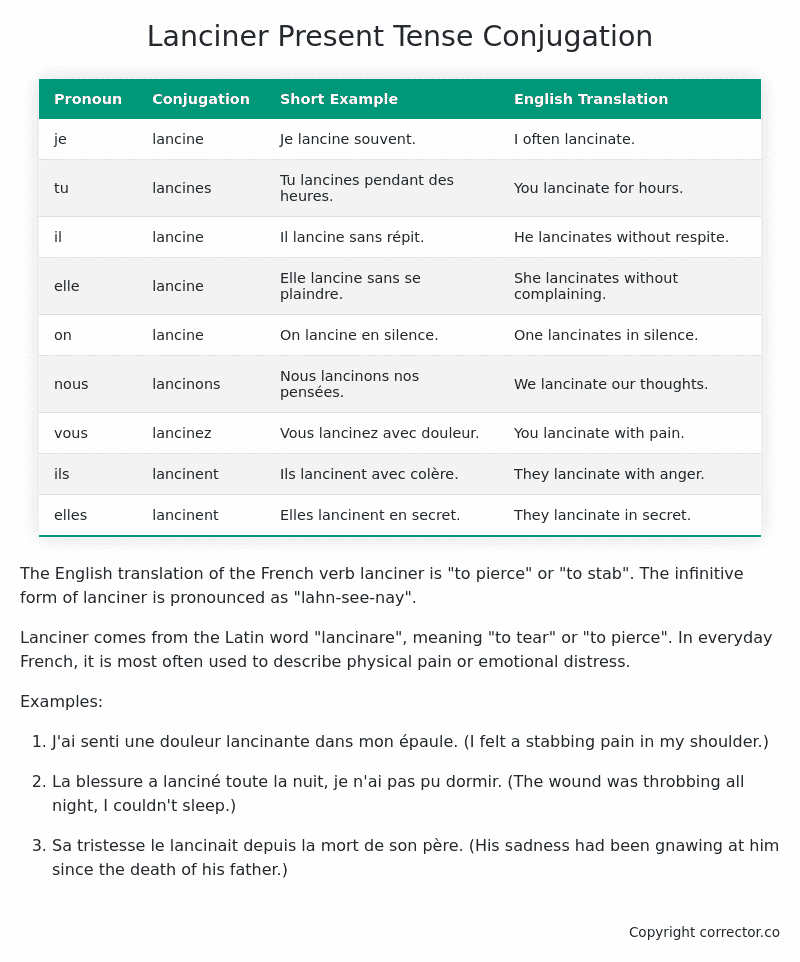Le Present (Present Tense) Conjugation of the French Verb lanciner
Introduction to the verb lanciner
The English translation of the French verb lanciner is “to pierce” or “to stab”. The infinitive form of lanciner is pronounced as “lahn-see-nay”.
Lanciner comes from the Latin word “lancinare”, meaning “to tear” or “to pierce”. In everyday French, it is most often used to describe physical pain or emotional distress.
Examples:
-
J’ai senti une douleur lancinante dans mon épaule. (I felt a stabbing pain in my shoulder.)
-
La blessure a lanciné toute la nuit, je n’ai pas pu dormir. (The wound was throbbing all night, I couldn’t sleep.)
-
Sa tristesse le lancinait depuis la mort de son père. (His sadness had been gnawing at him since the death of his father.)
Lanciner – About the French Present Tense
To take a deep dive into all the French tenses then see our article on Mastering French Tense Conjugation.
Common Everyday Usage Patterns For Le Present
Interactions with Other Tenses
Table of the Present Tense Conjugation of lanciner
| Pronoun | Conjugation | Short Example | English Translation |
|---|---|---|---|
| je | lancine | Je lancine souvent. | I often lancinate. |
| tu | lancines | Tu lancines pendant des heures. | You lancinate for hours. |
| il | lancine | Il lancine sans répit. | He lancinates without respite. |
| elle | lancine | Elle lancine sans se plaindre. | She lancinates without complaining. |
| on | lancine | On lancine en silence. | One lancinates in silence. |
| nous | lancinons | Nous lancinons nos pensées. | We lancinate our thoughts. |
| vous | lancinez | Vous lancinez avec douleur. | You lancinate with pain. |
| ils | lancinent | Ils lancinent avec colère. | They lancinate with anger. |
| elles | lancinent | Elles lancinent en secret. | They lancinate in secret. |
Other Conjugations for Lanciner.
Le Present (Present Tense) Conjugation of the French Verb lanciner (this article)
Imparfait (Imperfect) Tense Conjugation of the French Verb lanciner
Passé Simple (Simple Past) Tense Conjugation of the French Verb lanciner
Passé Composé (Present Perfect) Tense Conjugation of the French Verb lanciner
Futur Simple (Simple Future) Tense Conjugation of the French Verb lanciner
Futur Proche (Near Future) Tense Conjugation of the French Verb lanciner
Plus-que-parfait (Pluperfect) Tense Conjugation of the French Verb lanciner
Passé Antérieur (Past Anterior) Tense Conjugation of the French Verb lanciner
Futur Antérieur (Future Anterior) Tense Conjugation of the French Verb lanciner
Subjonctif Présent (Subjunctive Present) Tense Conjugation of the French Verb lanciner
Subjonctif Passé (Subjunctive Past) Tense Conjugation of the French Verb lanciner
Subjonctif Imparfait (Subjunctive Imperfect) Tense Conjugation of the French Verb lanciner
Subjonctif Plus-que-parfait (Subjunctive Pluperfect) Tense Conjugation of the French Verb lanciner
Conditionnel Présent (Conditional Present) Tense Conjugation of the French Verb lanciner
Conditionnel Passé (Conditional Past) Tense Conjugation of the French Verb lanciner
L’impératif Présent (Imperative Present) Tense Conjugation of the French Verb lanciner
L’infinitif Présent (Infinitive Present) Tense Conjugation of the French Verb lanciner
Struggling with French verbs or the language in general? Why not use our free French Grammar Checker – no registration required!
Get a FREE Download Study Sheet of this Conjugation 🔥
Simply right click the image below, click “save image” and get your free reference for the lanciner Present Tense tense conjugation!

I hope you enjoyed this article on the verb lanciner. Still in a learning mood? Check out another TOTALLY random French verb present conjugation!


